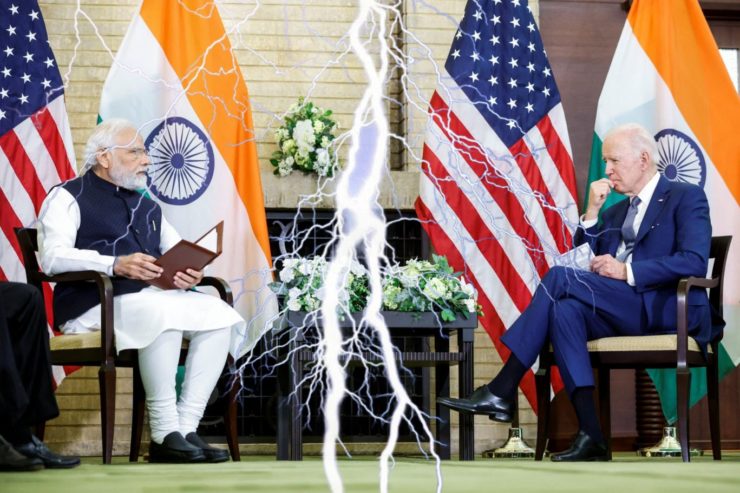
On 26 January, the people of India celebrated the main bank holiday, Republic Day, which commemorates the adoption of the Constitution and the country’s transition from being a British colony to a sovereign democratic state.
It is a very important holiday for the people of India – a day off when schools, institutes, government organisations and most businesses are closed. In New Delhi and state capitals, there are festive processions and grand military parades with the participation of all branches of the armed forces. On the main avenue of the Indian capital, where the main parade took place, this year about 77 thousand spectators gathered.
Every year, India invites high-ranking foreign guests to the parade, and the fact that the invitation is extended is a recognition of the importance for the Indian leadership of developing partnership relations with the country represented by the guest. At one time, in 2015, an invitation to this celebration was extended to the then US President B. Obama, who did not fail to take advantage of it. Last year, Egyptian President Abdel Fattah el-Sisi was the guest of Republic Day.
This year, American President J. Biden was expected to visit India. In September 2023, during the US President’s participation in the G20 Summit, the Indian side invited him to be the guest of this great bank holiday. The invitation was accepted. However, on December 12, it became known that the head of the White House suddenly cancelled the visit. And this in the context of unprecedented progress in US-India relations in recent years. We had to urgently change Biden for Macron. The French president did not refuse.
What could be the reason for the reluctance of the current US President to participate in India’s bank holidays?
In the context of an extremely aggravated international situation associated with the ongoing attempts to forge a global anti-Russian alliance, Washington is increasing pressure on countries that refuse to join sanctions against Russia over the Ukrainian crisis. At a time when Western countries expect New Delhi to be completely subservient in its foreign policy, India is making several open political démarches against the West, most notably against the US. Prime Minister Narendra Modi is allowing himself the luxury of prioritising Indian national interests, which is unacceptable in these circumstances.
India refrains from making harsh statements in connection with the conflict in Ukraine and avoids condemning Russia’s actions. To strengthen its own defence capability, it is buying the S-400 missile system from Russia. It ensures its energy security by continuing to buy tonnes of coal and millions of barrels of crude oil from Russia. And all this despite the fact that US officials regularly express concern after concern about such behaviour by New Delhi. The fact that the Indian economy is going through a stage of active industrialisation and needs supplies of fuel resources to increase the pace of development is not taken into account in any way.
The Americans broadcast positivity to the public in every possible way. They assure of their desire to increase cooperation with the Indians in the widest range of areas: counter-terrorism, combating organised crime, money laundering and financial fraud. They promise to establish the closest and diversified co-operation of various agencies of the economic bloc, solve problems in bilateral trade, speed up the procedure of information exchange, etc. During Modi’s visit to the US, they even organised an unusually grandiose reception.
And in reality.
The CIA leaks to Canadians some hitherto unconfirmed information about the alleged involvement of Indian intelligence services in the assassination of Sikh separatist H.S. Nijjar. Next, the FBI allegedly prevents an assassination attempt on another Sikh leader, G.S.Pannun on the territory of the USA itself. The US authorities are encouraging Indian-origin politicians and congressmen to criticise the Indian leadership.
The US Department of Justice is launching its own investigation into the assassination attempt, claiming the involvement of high-ranking Indian intelligence officers in the incident and threatening to demand that Interpol issue “red notices” against them if the Modi government does not recognise the fact of the assassination attempt and does not guarantee the absence of similar incidents in the future.
However, no evidence base sufficient to launch an investigation has been provided either in the case of Nijjar or Pannun. Moreover, it is worth recalling that the Indian authorities have repeatedly requested the US side to arrest and interrogate Pannun, who is suspected of organising attacks on Indian diplomatic missions in the US. Pannun’s bomb threats on Air India flights have also been ignored by the US side. Washington has repeatedly refused to provide data on Sikh separatists living in the US, as well as to extradite the organisers of the 2008 terrorist attack in Mumbai, T.H. Rana and D. Hadley.
It should also be noted that another QUAD summit was to be held after the Republic Day celebrations. But the Quartet meeting cannot take place without the American leader.
There is a feeling that the US has a certain plan in its relations with India, as a result of the implementation of which New Delhi should become an obedient conductor of American ambitions in the Asian region, primarily in the confrontation with Russia and China.
Maybe New Delhi should pay more attention to those partners who do not exert any pressure and do not try to tell New Delhi who to be friends with and who not to be friends with. Then it will be possible to feel the difference between the American-centric system of world order that the West is trying to impose, and the multipolar system advocated by the most progressive states.
Fernando GAILLARDO, political observer, especially for the online magazine “New Eastern Outlook”